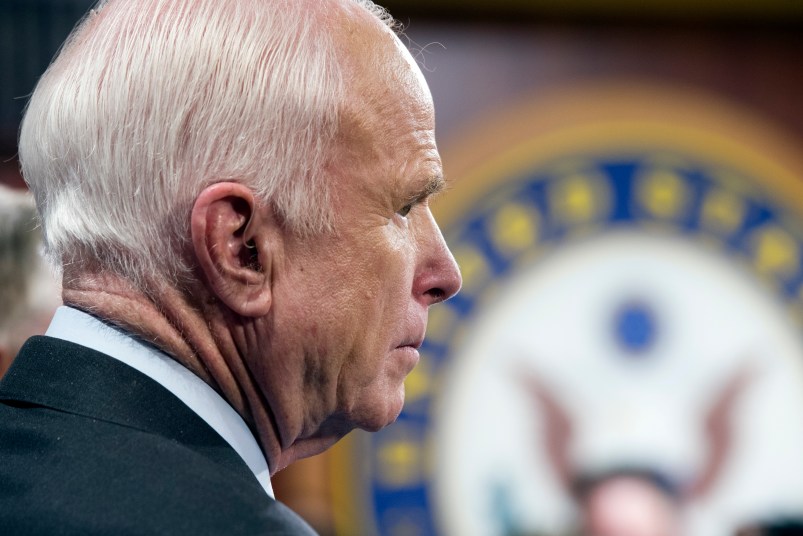In his statement Friday sticking a knife in the GOP’s last-ditch effort to repeal the Affordable Care Act, Sen. John McCain (R-AZ) pleaded with his colleagues—again—to return to following basic Senate lawmaking procedure and work together across the aisle. Specifically, he called for the resumption of negotiations between Democrats and Republicans on a bipartisan fix for Obamacare’s vulnerable markets that Sen. Lamar Alexander (R-TN) abruptly called off earlier this week amid GOP fervor for another whack at repeal.
“Senators Alexander and [Patty] Murray have been negotiating in good faith to fix some of the problems with Obamacare. But I fear that the prospect of one last attempt at a strictly Republican bill has left the impression that their efforts cannot succeed,” McCain said. “I hope they will resume their work should this last attempt at a partisan solution fail.”
In his statement, McCain pointed to the apparent collapse of yet another GOP-only health care bill as evidence that both parties need to work together, saying that failing to do so will mean every new administration will attempt to repeal the policies of the last.
“The issue is too important, and too many lives are at risk, for us to leave the American people guessing from one election to the next whether and how they will acquire health insurance,” he said. “A bill of this impact requires a bipartisan approach.”
Sen. Patty Murray (D-WA), the top Democrat on the Health, Education, Labor and Pensions Committee who had been negotiating for months with Alexander, quickly jumped on McCain’s statement by announcing she is more than willing to resume those talks.
“I agree with Senator McCain that the right way to get things done in the Senate—especially on an issue as important to families as their health care—is through regular order and working together to find common ground,” she said. “I’m still at the table ready to keep working, and I remain confident that we can reach a bipartisan agreement as soon as this latest partisan approach by Republican leaders is finally set aside.”
Minutes later, Senate Minority Leader Chuck Schumer (D-NY) echoed Murray’s insistence that Democrats are ready to pick back up where they left off. “I have assured Senator McCain that as soon as repeal is off the table, we Democrats are intent on resuming the bipartisan process,” he said.
Before Republicans cut off negotiations this week, the emerging bipartisan deal between Murray and Alexander aimed to guarantee cost-sharing reduction subsidies to insurers for at least a year, which would stabilize Obamacare’s individual market and take away much of Trump’s power to sabotage it (Trump has repeatedly threatened to end the subsidies). The deal also would have given state governments much more freedom to waive Obamacare’s insurance regulations—a major concession from Democrats in order to keep the talks alive.
Even some Republicans, including Iowa Senator Joni Ernst, expressed support for returning to the negotiating table.
At town hall, @SenJoniErnst calls for bipartisan ACA talks. "I hope that Lamar and Patty can come back again together, hopefully next week."
— Dave Weigel (@daveweigel) September 22, 2017
Alexander’s office did not respond to TPM’s inquiry as to whether he planned to resume negotiations.
Without a stabilization bill, experts predict that insurance companies will hike their rates significantly to account for the risk that Trump may cut off the subsidies—which go towards care for low-income people with severe health needs. Alexander and Murray had attempted to get a deal done by the end of September, when insurers will file their 2018 rates.










